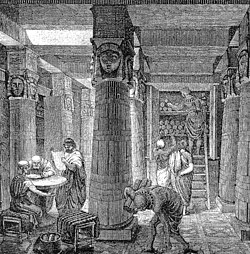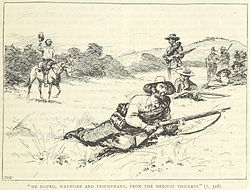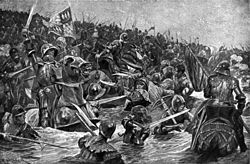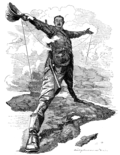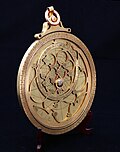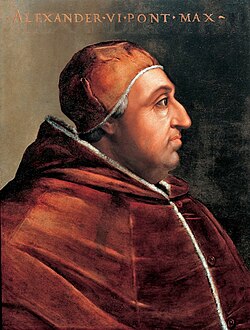Portal:History
The History Portal
History is the systematic study of the past, focusing primarily on the human past. As an academic discipline, it analyses and interprets evidence to construct narratives about what happened and explain why it happened. Some theorists categorize history as a social science, while others see it as part of the humanities or consider it a hybrid discipline. Similar debates surround the purpose of history—for example, whether its main aim is theoretical, to uncover the truth, or practical, to learn lessons from the past. In a more general sense, the term history refers not to an academic field but to the past itself, times in the past, or to individual texts about the past.
Historical research relies on primary and secondary sources to reconstruct past events and validate interpretations. Source criticism is used to evaluate these sources, assessing their authenticity, content, and reliability. Historians strive to integrate the perspectives of several sources to develop a coherent narrative. Different schools of thought, such as positivism, the Annales school, Marxism, and postmodernism, have distinct methodological approaches.
History is a broad discipline encompassing many branches. Some focus on specific time periods, such as ancient history, while others concentrate on particular geographic regions, such as the history of Africa. Thematic categorizations include political history, military history, social history, and economic history. Branches associated with specific research methods and sources include quantitative history, comparative history, and oral history.
History emerged as a field of inquiry in antiquity to replace myth-infused narratives, with influential early traditions originating in Greece, China, and later in the Islamic world. Historical writing evolved throughout the ages and became increasingly professional, particularly during the 19th century, when a rigorous methodology and various academic institutions were established. History is related to many fields, including historiography, philosophy, education, and politics. (Full article...)
Featured picture
Did you know (auto generated)

- ... that soccer player Danielle Marcano scored four goals in back-to-back games that helped to send the University of Tennessee to the NCAA tournament quarterfinals for the first time in history?
- ... that throughout the history of education in Wales, schools have been held in monastic settlements, cathedrals, residential houses, marketplaces, barns, churches, and village halls?
- ... that the Three Bards are the most celebrated poets in the history of Polish literature?
- ... that Gary Tuggle, as head of Philadelphia's Drug Enforcement Administration division, led potentially the largest prepackaged heroin seizure in Delaware history?
- ... that historically, native mercury was extracted from rocks mined in Idrija by washing them in the stream Nikova?
- ... that Cris Tinley was the youngest-ever cricketer in Nottinghamshire's history for 177 years?
Fakih Usman (alternatively spelled as Faqih Usman; [faˈkɪh ʊsˈman]; 2 March 1904 – 3 October 1968) was an Indonesian Islamic leader and politician of the Masyumi Party. He twice served as the Minister of Religious Affairs under the cabinets of Abdul Halim and Wilopo from January until September 1950, and again from 1952 until 1953. In his early years, Fakih was criticized by conservative Muslims for his involvement with the modernist Islamic Muhammadiyah organization, though he is remembered fondly by the group. Born to a merchant and his wife in Gresik, Dutch East Indies, Fakih studied with his father and at a series of pesantren (Islamic boarding schools) until the 1920s.
In 1925 he became involved with the Muhammadiyah, rising quickly through the leadership until he became the head of the Surabaya branch in 1938. He was also active in local politics, in 1937, he became the treasurer of the Indonesian Islamic Assembly. He continued to be involved in politics and Islamic groups during the Japanese occupation and the ensuing national revolution. Following the end of the war, he was appointed Minister of Religious Affairs. As a minister, he oversaw educational and institutional reform, growing in prominence within the Muhammadiyah. He also served as deputy chairman of the organization under several different leaders before being chosen as its chairman in late 1968. He died several days later. (Full article...)
On this day
May 4: Youth Day in China; Literary Day in Taiwan; Star Wars Day
- 1493 – Pope Alexander VI (pictured) issued the papal bull Inter caetera, establishing a line of demarcation dividing the New World between Spain and Portugal.
- 1776 – American Revolution: The Colony of Rhode Island and Providence Plantations became the first of the Thirteen Colonies to renounce its allegiance to the British Crown.
- 1942 – World War II: Aircraft from Imperial Japanese Navy vessels attacked Allied naval forces, beginning the Battle of the Coral Sea, the first naval action in which the participating ships never sighted or fired directly at each other.
- 1974 – An all-female Japanese team reached the summit of Manaslu in the Himalayas, becoming the first women to climb a peak higher than 8,000 metres (26,247 ft) above sea level.
- 1979 – Margaret Thatcher became the first female prime minister of the United Kingdom.
- John Nevison (d. 1684)
- Nettie Stevens (d. 1912)
- Audrey Hepburn (b. 1929)
Selected quote
Victorious warriors win first and then go to war, while defeated warriors go to war first and then seek to win.
— Sun Tzu, Ancient Chinese military strategist
Related portals
More Did you know...
- ... that Giovanni de Ventura, a plague doctor who may have worn a beak doctor costume (pictured), was restricted by a covenant to treat only infectious patients? In the nose of the mask, there were types of plants that were used to filter the sickness from the wearer.
- ... that in some archaic Greek alphabets, an Ε could look like a Β, a Β like a C, a Γ like an Ι, an Ι like a Σ, or a Σ like an Μ?
- ... that the Chinese government has published a list of sixty-four important cultural relics that are forbidden to be exhibited outside of China?
- ... that the 1886 novel Albertine expedited the abolition of public prostitution in Norway?
- ... that Carl Sagan worked with the US Air Force on detonating a nuclear device on the Moon?
- ... that Olympic gold medals have been made out of silver, jade, and glass?
- ... that in 1945 a Japanese battalion was rearmed to serve alongside the British 5th Parachute Brigade in the Far East?
- ... that Solomon was accidentally castrated as an infant?
Topics
Categories

History • By period • By region • By topic • By ethnic group • Historiography • Archaeology • Books • Maps • Images • Magazines • Organizations • Fictional • Museums • Pseudohistory • Stubs • Timelines • Chronology • People • Wikipedia historians
WikiProjects
![]() WikiProject History •
Ancient Near East • Australian History • Classical Greece and Rome • Dacia • Former countries • History of Canada • Chinese history • European history • Heraldry and vexillology • Indian history • Jewish history • Medieval Scotland • Mesoamerica • Military history • Middle Ages • History of Science
WikiProject History •
Ancient Near East • Australian History • Classical Greece and Rome • Dacia • Former countries • History of Canada • Chinese history • European history • Heraldry and vexillology • Indian history • Jewish history • Medieval Scotland • Mesoamerica • Military history • Middle Ages • History of Science
WikiProject Time • Days of the Year • Years
WikiProject Biography • Composers • Political figures • Saints • United States Presidents
Things you can do
 |
Here are some tasks awaiting attention:
|
Associated Wikimedia
The following Wikimedia Foundation sister projects provide more on this subject:
-
Commons
Free media repository -
Wikibooks
Free textbooks and manuals -
Wikidata
Free knowledge base -
Wikinews
Free-content news -
Wikiquote
Collection of quotations -
Wikisource
Free-content library -
Wikiversity
Free learning tools -
Wiktionary
Dictionary and thesaurus

